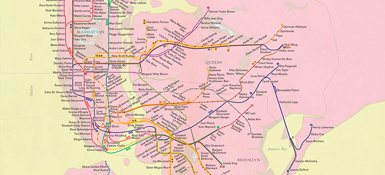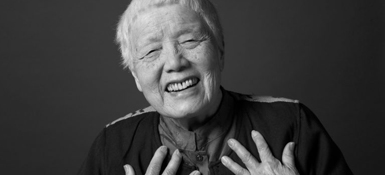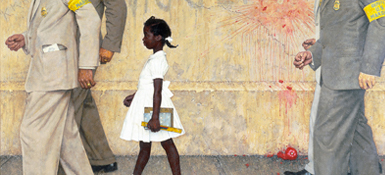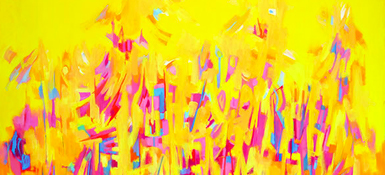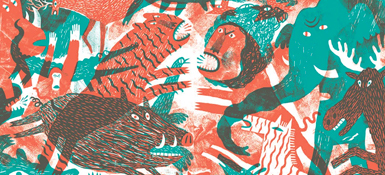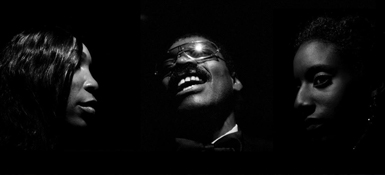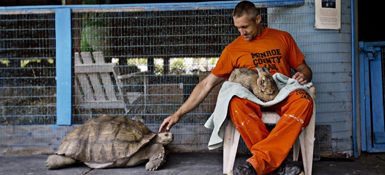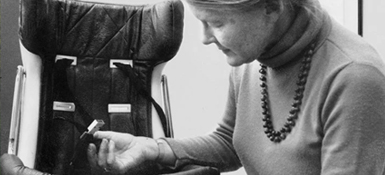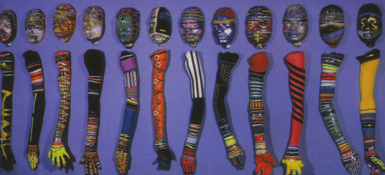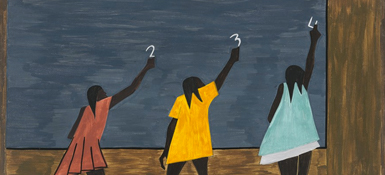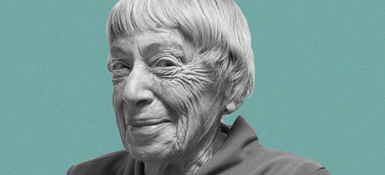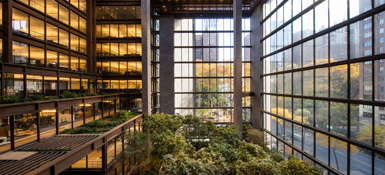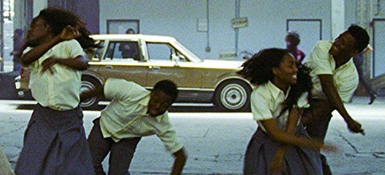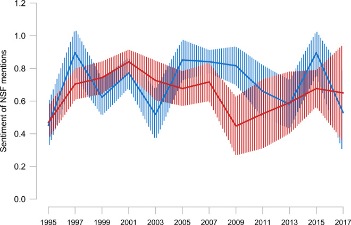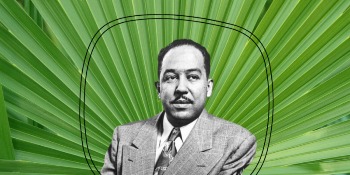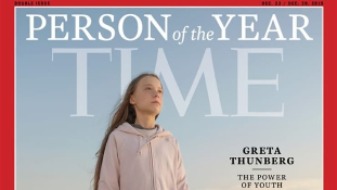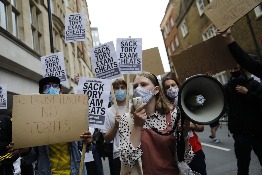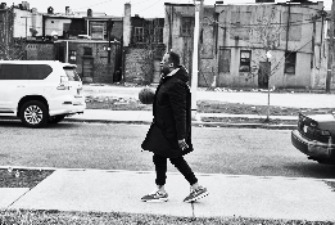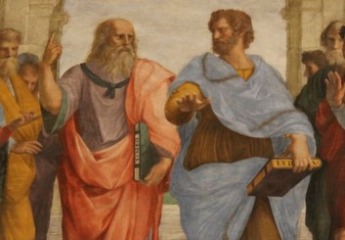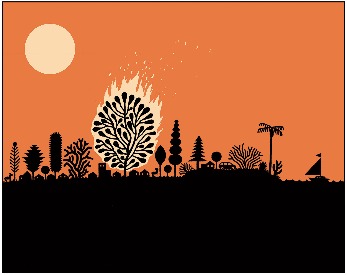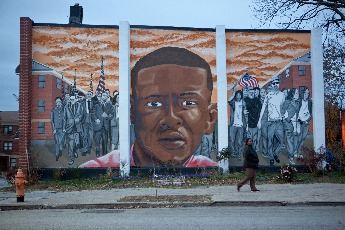Common Good
In 2020–21, CQ asked you: What is the common good?
How do we define what is good for society as a whole? What happens when collective benefit runs counter to individual benefit? How are questions and assumptions about the common good built into academic inquiry, as well as our daily lives?
The sources below consider these questions from creative, scientific, and humanistic perspectives. We invite you to start with these core sources, wander further down to the “Explore” section, and join the conversation.
Start Here
-
Can AI Help Improve the Health of American Democracy?
Scholars at the Stavros Niarchos Foundation Agora Institute at Johns Hopkins examine how generative AI is reshaping our politics and policy-making and ask whether AI can help us improve the health of American democracy.
Photo by Element5 Digital on Unsplash
-
Why you fight infection better in the daytime
The human body is better at fighting infections during the day. Find out why in this episode of Short Wave.
Image via NPR’s Shortwave Podcast.
-
A visual history of women in public health
Red Cross Nurses Handing Out Wool for Knitting by William H. Johnson, born Florence, SC 1901-died Central Islip, NY 1970. Smithsonian American Art Museum, Gift of the Harmon Foundation.
See the collection here.
Image by William H. Johnson, via the Smithsonian Institution.
-
With Turn Again to the Earth, environmental health is front and center at the Baltimore Museum of Art
Through January, the Baltimore Museum of Art’s suite of environmentally focused exhibitions, Turn Again to the Earth, invites visitors to consider the relationship between the Earth and the arts. On Thursday, Sept. 16th, the BMA will host College Night. Students with a valid college ID are invited to view and make art and to make new friends while enjoying tasty snacks.
Photo by Mike Steele via Flickr, CC License
-
How a new neural prosthetic bypasses physical speech and turns thought into language
A new brain-computer interface represents a breakthrough in neural prosthetics, allowing users to merely think words and have them appear on a screen. The potential to improve a patient’s ability to communicate are massive, as are the ethical implications of so-called “inner-voice translators.”
Read the full published academic research in Cell.
Photo by Volodymyr Hryshchenko on Unsplash
-
The dream of a healthy Inner Harbor is alive in Baltimore
In this episode of the Bloomberg School of Public Health’s Public Health On Call podcast, producer Lindsay Smith Rogers reports on the ongoing effort to make Baltimore’s Inner Harbor safe for swimmers. For more episodes of Public Health On Call, visit their YouTube page or subscribe in Spotify or Apple Podcasts.
Photo by Brendan Beale on Unsplash
-
What antibiotics and fossil fuels have in common
In the 20th century, antibiotics revolutionized healthcare and paved the way for advanced medical protocols and procedures, but just as fossil fuels both advanced and encumbered human societies, the overuse of antibiotics now poses a threat to human health. Biologist Liam Shaw argues that a more judicious approach to using antibiotics is the best way forward.
Photo by Roberto Sorin on Unsplash
-
Can an AI chatbot be your therapist? Experts warn against it.
While AI chatbots can seem informed, clever, and even charming, most mental healthcare practitioners warn against using the technology in place of a human therapist.
Photo by Christina Morillo on Pexels.
-
Discussing vaccines amid the partisan divide
Biostatistician Jeffrey Morris on the necessity—and the challenges—of addressing vaccine misinformation in a politically polarized age.
-
What HBO’s breakout medical drama The Pitt gets right about emergency medicine, according to JHU’s Dr. Lukas Ramcharran
Vulture‘s Nicholas Quah talks to Dr. Lukas Ramcharran of the Johns Hopkins University School of Medicine about what HBO’s breakout hit The Pitt gets right (and wrong) about emergency medicine.
Photo by National Cancer Institute on Unsplash
-
Using music to improve health, wellness, and recovery at Johns Hopkins University Hospital
At the Johns Hopkins University Hospital, music is more than mere entertainment. It’s also a vehicle for attaining better physical, mental, and emotional health. For a decade, the Johns Hopkins Center for Music and Medicine has investigated how the body, mind, and music are related and how music can be used in the treatment of depression, Alzheimer’s, stroke, and more.
Photo by Pavel Danilyuk on Pexels
-
How many steps should you be taking each day? New research provides an answer.
You’ve probably heard that you should be taking 10,000 steps a day in order to maintain good health, increase your odds of living longer, and improve your cardiovascular fitness. What you might not know is that the number of recommended steps originated in the 1960s, when the Japanese Yamasa Clock company was marketing its mechanical pedometer. More than 70 years later, a new systematic review and scientific meta-analysis is giving physicians and the public a clearer picture of how many daily steps are beneficial to human health.
Listen to the story here, and read the scientific study here.
Photo by Sincerely Media on Unsplash
-
A game-changing blood test for the early detection of Alzheimer’s
In May, the Federal Drug Administration approved an inexpensive and noninvasive blood test developed by a team including Johns Hopkins scientists that could help physicians detect Alzheimer’s disease significantly earlier than previously possible.
Photo by Hush Naidoo Jade Photography on Unsplash.
-
On the complexities of using war metaphors to describe medical treatment
What do we gain and what do we lose when we use war metaphors to describe our experiences with illness and disease? On this episode of the Defining Moments podcast, Dr. Joe Bianco discusses the common practice of describing medical interventions using war metaphors with Dr. Elena Semino, Distinguished Professor of Linguistics and English Language at Lancaster University.
-
Five years later, revisiting images of the COVID-19 Pandemic in Baltimore
In association with a special issue on COVID-19, the Bulletin of the History of Medicine and the Program in Arts, Humanities, & Health at the Johns Hopkins School of Medicine have sponsored an exhibition documenting Baltimore’s experiences of the COVID-19 pandemic. Curated by Baltimore-based photographer J.M. Giordano, the exhibition captures the tumult and some tender moments during of the lockdown era in Baltimore.
Learn more and view images from the exhibition here.
Photo by Mark König on Unsplash
-
Social isolation may lead to physiological changes to the brain
Following the lockdown era of the COVID-19 Pandemic, scientists around the globe have been examining the relationship between social isolation and neurological health, and the initial findings are telling. Learn more about research that has implications for future human-staffed space exploration, field research in remote locations, mental healthcare professionals, the criminal justice system, quarantines, and more.
Photo by Milad Fakurian on Unsplash
-
What is Planetary Health?
In April 2024, JHU launched the Johns Hopkins Institute for Planetary Health (JHIPH) to accelerate cross-university collaboration in addressing the degradation of Earth’s natural systems and its impacts on human health and well-being. Learn more about this bold interdisciplinary initiative and about how scientists, educators, researchers, and policy makers are collaborating to address the urgency of this moment and to advance solutions that safeguard health on our rapidly changing planet.
-
Health and Wellness Resources for Students at JHU
Are you a JHU student looking for health and wellness resources? Johns Hopkins has a robust range of health and wellness-related services and information available to affiliates, including resources related to mental health, physical health, spiritual health, and more.
Photo by Gang Hao on Unsplash.
-
Kaufman, Post-Traumatic Growth: Finding Meaning and Creativity in Adversity
Image source: Scientific American
“By embracing psychological flexibility, we face the world with exploration and openness and are better able to react to events in the service of our chosen values.”
-
Collective Photo Essay
Image source: The Walters Museum
“This Celadon Box features kintsugi, a Japanese repair technique called kintsugi, which uses a mixture of lacquer and gold, silver, or platinum to mend an object in a way that highlights (rather than hides) the damage.”
This is community project in progress. Check back here throughout the year and submit your own photo for the collective photo essay.
-
Baltimore Museum of Art
Image: Elizabeth Talford Scott’s Quilt, “Plantation”
“The Baltimore Museum of Art connects art to Baltimore and Baltimore to the world, embodying a commitment to artistic excellence and social equity in every decision.”
PDF Document: View list of source and image citations.
EXPLORE
We spent the early summer of 2020 exploring the idea of the common good, and the sources here are ones we found along our way. Some came immediately to mind, like the TV series The Good Place or The Migration Series of paintings by Jacob Lawrence. Some, like Imani Perry’s essay on the “defiant joy” of Blackness, are just published. Some come from familiar places we turn to again and again for inspiration and meaning—Baltimore City, the BMA, This American Life, Brainpickings. Here are places to wander, to get lost, to find new pathways.
-
The Good Place, NBC
Streaming on Netflix
-
Rebecca Solnit
“City of Women”
-
On Being with Krista Tippett
“Grace Lee Boggs: A Century in the World”
-
The Baltimore Sun
“Abel Wolman, father of clean water; Sanitary engineer: His 75-year career led to better health for millions around the world”
-
This American Life
“The Problem We All Live With – Part 1”
-
Baltimore Museum of Art
Generations: A History of Black Abstract Art
-
Imani Perry
“Racism is Terrible. Blackness is Not.”
-
Robert W. Stock
“Safety Lessons from the Morgue”
-
Afaa Michael Weaver
“Poets on Poetry”
-
Jacob Lawrence
The Migration Series
-
Rachel Carson
The Sea Around Us (1951)
-
Ursula K. LeGuin
“She Unnames Them”
-
Darren Walker
“Are You Willing to Give Up Your Privilege?”
-
Common Good Playlist
Created by students in the “What is the Common Good?” First Year Seminar
-
Common Good Film Series
“See full series here”
-
Science Advances
”What does Congress want from the National Science Foundation?”
-
Langston Hughes
”Dreams”
-
Greta Thunberg
”The disarming case to act right now on climate change”
-
The New York Times
”British Grading Debacle Shows Pitfalls of Automating Government”
-
Plato
Euthyphro
-
Bill McKibben
”130 Degrees”
-
Sandrine Frémeaux
”A Common Good Perspective on Diversity”


